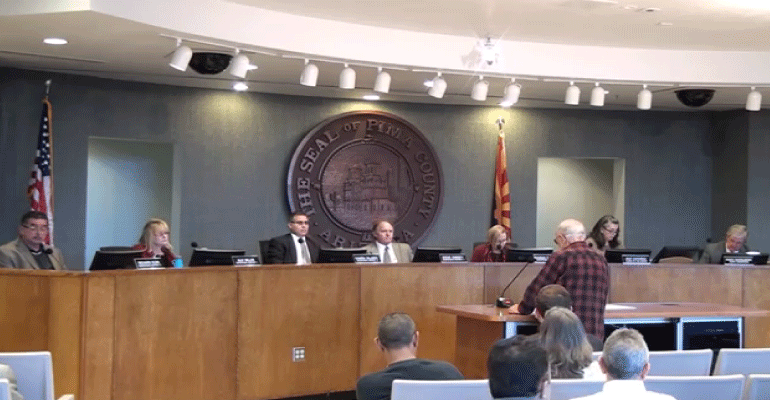
On January 3 the ADI reported on a formal complaint lodged with the Pima County Board of Supervisors charging the County Administrator and his staff with “adversely affecting” county residents in the Avra Valley by violating Board of Supervisors Resolution 2007-343 which opposes a new highway in the Avra Valley. The complaint was filed by Picture Rocks activist Albert Lannon at the January 2, 2018, BOS meeting, citing the Pima County Regulatory Bill of Rights.
The ten-page complaint cited the plain language of the law: “Individuals alleging that they have been adversely affected by a county or flood control district ordinance, rule, substantive policy statement or practice in violation of the applicable Regulatory Bill of Rights may submit a written complaint to the relevant department Director or their designee. The written complaint must contain the name and address of the adversely affected person making the complaint, reference to the specific ordinance, rule, regulation, substantive policy statement or practice alleged to violate the Regulatory Bill of Rights together with the factual and legal basis for the complaint. The department Director or designee will have fifteen business days following receipt of the complaint to review the complaint and respond to the complainant.”
Lannon listed a number of areas where County Administrator Charles Huckelberry and his staff have actively pursued securing an Interstate 11 route through the Avra Valley, contrary to county policy and against the overwhelming wishes of the residents. Those statements and practices, he said, mis-used his tax dollars and have resulted in the current Arizona Dept. of Transportation I-11 Environmental Impact Study narrowing I-11 route choices down to just two, the existing I-10 or the Avra Valley highway Huckelberry and his staff have been promoting for the last five years. In addition to these “adverse effects” such a highway would bring more adversity to the 25,000 residents of the valley with noise, air and light pollution, restricted wildlife movement, increased smuggling, and loss of tourism.
The law provides that complaints be filed with the “department director or designee.” Since Huckelberry is the subject of the complaint as well as head of his department, it was appropriate to bring the complaint to the chair of the Board of Supervisors, which hired him and to whom the county administrator ostensibly reports. The next day Sharon Bronson announced her impending resignation as BOS chair, and Richard Elias was handed the gavel on January 16.
Following the initial complaint, dozens of concerned citizens filed shorter complaints of their own charging mis-use of their tax dollars and other adverse effects from I-11. These were sent to the Clerk of the BOS since it was not known who the next chair would be, and protocol dictates that materials for Board members go through the Clerk, Julie Castañeda.
While Lannon has not received any acknowledgement or response from the Board to date, and the statutory 15 business days to respond has passed, several of those who filed later complaints have received letters from the County Attorneys office:
Although the complaints were addressed to the Chair of the BOS via the Clerk, Mr. Flagg responds “on behalf of the Pima County Administrator,” the very person the complaint is aimed at, and then dismisses the charges without discussion. This suggests that the County Attorney’s office is either completely ignorant of their own Regulatory Bill of Rights, or that they didn’t actually read the complaints, or that they are simply stonewalling at the County Administrator’s direction. Or all three.
Which, of course, raises the larger question: Who really makes policy for Pima County? Elected officials or their hired hands? If the Board of Supervisors, put in place by the voters, makes meaningless policies that can be arbitrarily overruled by Charles Huckelberry, a non-elected county employee, then what does the word democracy really mean in Pima County? Why spend tax dollars on elections if we have a virtual dictator who can overrule his employers – and the voters — at will?
Lannon, who is 80 years old and suffers from heart and kidney disease along with cancer and COPD, is willing to give the Supervisors the benefit of the doubt. He told ADI that since Bronson ducked the issue, Richard Elias still has a few days to respond within the statutory 15 business days since he assumed the chair. If there is no timely response, he said, or if the response is the kind of stonewalling that Andrew Flagg is sending out, he may show up at the February 6 BOS meeting to insist on an appropriate relevant response, “whatever it takes.”
“Sometimes,” he added, “the democratic process needs a little nudge to make it work.”
